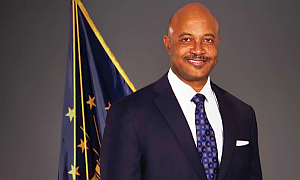 The U.S. Supreme Court Friday ruled in favor of Attorney General Curtis Hill by upholding the constitutionality of an Indiana law requiring the dignified disposition of fetal remains by healthcare facilities.
The U.S. Supreme Court Friday ruled in favor of Attorney General Curtis Hill by upholding the constitutionality of an Indiana law requiring the dignified disposition of fetal remains by healthcare facilities.
Signed into law in March of 2016 by then-Gov. Mike Pence, House Enrolled Act 1337 requires abortion clinics and other healthcare facilities in possession of aborted or miscarried fetuses to dispose of them either by cremation or interment.
“This Court has already acknowledged that a State has a ‘legitimate interest in proper disposal of fetal remains,’ ” the justices stated in today’s decision. “The Seventh Circuit clearly erred in failing to recognize that interest as a permissible basis for Indiana’s disposition law.”
Attorney General Hill expressed satisfaction with the Supreme Court’s appropriate consideration of the fetal remains matter.
“The highest court in the land has now affirmed that nothing in the Constitution prohibits states from requiring abortion clinics to provide an element of basic human dignity in disposing of the fetuses they abort,” Attorney General Hill said. “These tiny bodies are, after all, human remains.”
The Supreme Court opted not to consider another part of the law that forbids abortions on the basis of race, sex or physical condition of an unborn child.
“Our opinion,” the Court stated, “expresses no view on the merits of the second question presented, i.e., whether Indiana may prohibit the knowing provision of sex-, race-, and disability-selective abortions by abortion providers. Only the Seventh Circuit has thus far addressed this kind of law. We follow our ordinary practice of denying petitions insofar as they raise legal issues that have not been considered by additional Courts of Appeals.”
In a concurring opinion, Justice Clarence Thomas observed that the histories of abortion and eugenics have long been intertwined.
“Even after World War II, future Planned Parenthood President Alan Guttmacher and other abortion advocates endorsed abortion for eugenic reasons and promoted it as a means of controlling the population and improving its quality,” Justice Thomas wrote. “Enshrining a constitutional right to an abortion based solely on the race, sex, or disability of an unborn child, as Planned Parenthood advocates, would constitutionalize the views of the 20th-century eugenics movement.”
Such concerns, he said, mean the issue will likely come before the U.S. Supreme Court again.
“Given the potential for abortion to become a tool of eugenic manipulation,” he wrote, “the Court will soon need to confront the constitutionality of laws like Indiana’s.”
Attached is the Supreme Court’s ruling on the matter.














